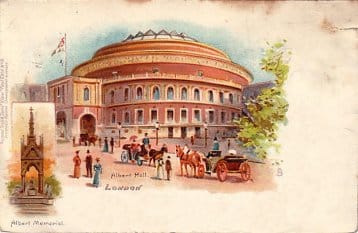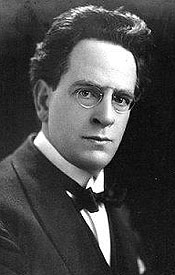Remembering John Herbert Foulds

Serenade readers who may have perused my short article in the in the very first issue of the magazine will be aware of my ever-deepening interest in India, Indian Philosophy and Spirituality and in the development of Western classical music in India. The subtlety of Indian Philosophy and Spirituality combined with the unique depth and insight of Western classical music surely provides unparalleled opportunities for artistic excellence.
I need hardly add that I am barely the first ‘Westerner’ to fall under India’s uniquely magical spell. One of the greatest unexplored intellectual themes in the history of post-Renaissance western civilisation is the influence of Hinduism and many aspects of Indian Philosophy on the intellectual and economic development of the United States of America, especially via the American transcendental philosophers, Emerson and Thoreau. The crucial philosophical notions of self-sufficiency and self-reliance, central to so many Indian texts, became philosophical cornerstones of the development of the United States in the 20th Century. Many of the very best Western ideas stem directly from India.
In due course, he made his way back to Manchester, being a member of Hans Richter’s Hallé Orchestra from 1900 to 1906. His idiosyncratic lifestyle meant that he never attended a Music Conservatory as a formal student and he was almost entirely self-taught as a composer. He did however study conducting for a time with Gustav Mahler (1860-1911), and in his later life Foulds frequently stressed how much he had learned from his professional interactions with Richard Strauss (1864-1949) and Ferruccio Busoni (1866-1924).
One English composer who was very concerned with the reality of ‘Thought as Substance’, a concept central to all true Philosophy, was the great Cyril Scott (1879-1970). I am currently recording a double-CD of Cyril Scott’s piano music for The Divine Art Recordings Group. Scott’s Piano Sonata Number 1, in particular, occupies a place as one of the greatest British piano works. In addition to being an extraordinarily prolific composer, Scott was also an author whose copious writings display great familiarity and admiration for innumerable aspects of Indian civilisation, including, for example, ayurvedic medicine as well as the immortal Indian philosophical texts. But no English composer has been more thoroughly and completely captivated by the Indian mind and imagination than John Foulds (1880-1939) whose music is happily enjoying a considerable revival of interest in the United Kingdom, at the moment.

John Herbert Foulds was born in Manchester, England, in 1880. His father was a bassoonist in the Hallé Orchestra. As a very young boy, Foulds acquired considerable expertise on the oboe, but, at the age of ten he switched to cello, which eventually became the instrument that in his earlier adult life enabled him with much of his livelihood. Unusually intellectually curious and adventurous from a very young age, John Foulds, having been composing music profusely from the age of seven, ran away from home at the age of thirteen in order to make his living playing the cello in seaside Orchestras. In due course, he made his way back to Manchester, being a member of Hans Richter’s Hallé Orchestra from 1900 to 1906. His idiosyncratic lifestyle meant that he never attended a Music Conservatory as a formal student and he was almost entirely self-taught as a composer. He did however study conducting for a time with Gustav Mahler (1860-1911), and in his later life Foulds frequently stressed how much he had learned from his professional interactions with Richard Strauss (1864-1949) and Ferruccio Busoni (1866-1924). Busoni, incidentally, was another major European figure with a great deal more than a passing interest in Indian civilisation, an interest which manifested itself most prominently in his magnificent ‘Indianisches Tagebuch’ for piano.
Foulds’s serious interest in Indian Philosophy and Spirituality dates from about 1905. But his interests became a consuming passion when he married his second wife, Maud McCarthy, who was a violinist and theosophist. After a period of living in Paris, Foulds and his wife relocated to London, where for many years they both followed strict Yogic practices in both diet and meditation. It was Foulds’s firm belief that it was by following these practices that he was able to write his best music. This also developed in him both clairvoyant and clairaudient abilities. Foulds’s daughter later recounted how Maud might hum a melody to herself, only to find that in another room, in the same house, Foulds had just composed that very melody.
I am glad his music is achieving well-deserved recognition and I hope that I shall, through my own performances of Foulds’s piano music, be contributing to a greater appreciation of this uniquely fascinating composer. Foulds’s music, especially his later music, is thoroughly imbued with the richness of Indian Philosophy and Spirituality. I find it a uniquely liberating experience to perform Foulds’s music.
The consuming passion felt by both of them for India inevitably led to their permanent relocation to the country which both of them believed held uniquely liberating spiritual insights into all of the ultimate matters of human existence. They arrived in Delhi in 1935. Foulds threw himself into a study of Indian music and later founded an Indo-European Orchestra, combining European and Indian instruments. At the time of his death from cholera in Calcutta in 1939, Foulds was working on a Symphony of East and West, which he believed would represent the culmination of his life’s work to date.
Foulds wrote a phenomenal amount of music, not all of which has survived. His orchestral music displays a glorious sense of colour matched only by the Indian sunsets and his piano music contributes greatly to the very fine body of piano works written by many British composers during the first sixty (or so ) years of the 20th Century. His interest and learning in many aspects of Indian civilisation was immense. I am glad his music is achieving well-deserved recognition and I hope that I shall, through my own performances of Foulds’s piano music, be contributing to a greater appreciation of this uniquely fascinating composer. Foulds’s music, especially his later music, is thoroughly imbued with the richness of Indian Philosophy and Spirituality. I find it a uniquely liberating experience to perform Foulds’s music.





